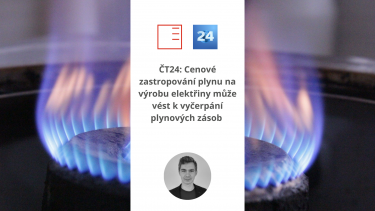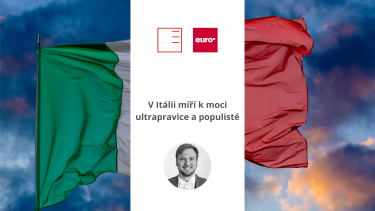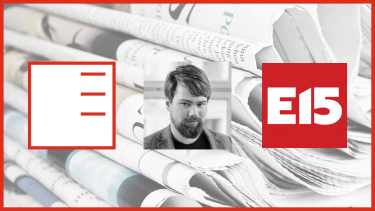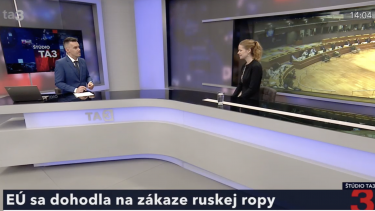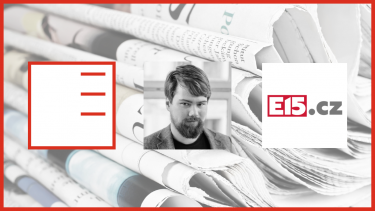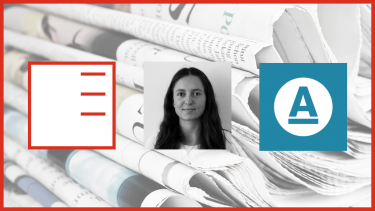CT24: Price cap on gas for electricity production may lead to gas depletion
At a joint meeting of EU ministers, possible solutions to high gas prices were discussed. Our researcher Michal Hrubý commented on the meeting for Událostí, komentáře ČT24. He warned, for example, against capping prices of gas used for electricity production, which could lead to the exhaustion of gas reserves due to low prices. On the other hand, he positively assessed the planned joint European purchases of gas, which could significantly help the Czech economy.
Show moreE15: The new Italian government must continue with reforms. Support for Ukraine in Rome will probably recede
One of our research associate, Alexandr Lagazzi, commented on the upcoming Italian elections for E15. According to pre-election polls, it can be assumed that the right-wing coalition led by Giorgia Meloni will win the elections. However, according to experts, this result could represent a significant risk for the Italian economy, the drawing of contributions from the EU and the supply of weapons to Ukraine.
Show more
Týdeník Euro: The far-right and populists are coming to power in Italy
Due to the premature fall of Draghi's government, Italians will go to the polls on Sunday 25 September. At stake, among other things, is how Rome will deal with the €200 billion covid bailout. Our research associate Alexandre Lagazzi has commented on the current situation.
Show more
E15: The fall of Johnson threatens the British economy. Ex-minister Sunak may become the new prime minister
Martin Vokálek, Executive Director of EUROPEUM, commented for E15 on the fall of the British Prime Minister. Why is he not surprised by his resignation and how does he perceive British political culture?
Show more
E15: Pád Johnsona ohrožuje britskou ekonomiku. Novým premiérem se může stát exministr Sunak
Martin Vokálek, výkonný ředitel Institutu pro evropskou politiku, se vyjádřil pro E15 k pádu britského premiéra. Proč ho jeho rezignace nezaskočila a jak vnímá britskou politickou kulturu?
Show more
FÓRUM sociální politiky: The Green Deal can be socially progressive
Our researcher Kateřina Davidová has written in the professional journal FORUM of Social Policy a short essay on how the Green Deal can be socially progressive. In the article, she summarises the current development of the Green Deal for Europe with a focus on socio-economic areas. The text argues that a socially just transformation to a low-carbon economy will only be achieved when the polluter pays principle is respected and free allowances are no longer handed out to big industry.
Show more
Studio TA3: The European Union has agreed on a partial ban on Russian oil. How will this affect the Slovak economy?
Our Associate Research Fellow Zuzana Stuchlíková gave an interview for Slovak TV TA3. Zuzana Stuchlíková talks about the process of approving the latest EU sanctions package against Russia and the ban on Russian oil imports. She discusses how the negotiations went, how the exemptions for Central Europe will work, what it means for fuel prices and what will happen next.
Show more
E15.cz: The Brexit deal is in danger of collapse. The dispute between Brussels and London can be settled by the Czechs
Martin Vokálek, executive director of the Europeum Institute for European Policy, commented for E15 on the tense situation between the European Union and the UK in the area of economy and trade. In particular, the problematic region of Northern Ireland and compliance with the so-called Good Friday Agreement. The emergence of new tariff barriers between Britain and the European bloc is thus clearly a real threat.
Show more
Policy Paper: The Future of Energy Poverty: Will the Social Climate Fund be enough for a Just Transition?
Our researcher Katharine Klačanský wrote a policy paper on "The Future of Energy Poverty: Will the Social Climate Fund be enough for a just transition?" in which she mentions, for example, that a just transition to a green economy is one that leaves no one behind.
Show more PDFAktuálně.cz: How to reduce dependence on Russia: Europe and others tackle gas, oil and coal cuts
Our researcher, Kateřina Davidová, commented for Aktuálně.cz on the latest package of sanctions against Russia by the European Union. According to her, the biggest impact on the Russian economy would be the restriction or ban on the purchase of mineral resources from the largest European customers or even from the whole European union. The best alternative to these energies would be to switch to renewable energy sources, says Kateřina Davidová.
Show more
Staroměstské náměstí 4/1
Prague 1 - Staré Město
110 00
tel.: +420 212 246 552
email: europeum@europeum.org
https://www.europeum.org
